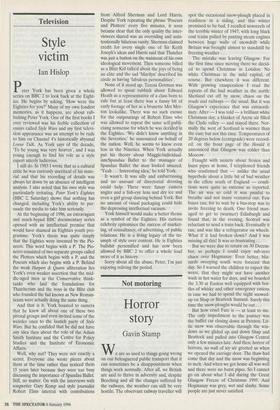Television
Style victim
Ian Hislop
Peter York has been given a whole series on BBC 2 to look back at the Eight- ies. He begins by asking, 'How were the Eighties for you?' Many of my own fondest memories, as it happens, are about rub- bishing Peter York. One of the first books I ever reviewed was his feeble collection of essays called Style Wars and my first televi- sion appearance was an attempt to be rude to him on Channel 4's historically abysmal Loose Talk. As York says of the decade, `To be young was very heaven', and I was young enough to find his role as a style expert utterly ludicrous.
I still do. In 1983 I wrote that as a cultural critic he was curiously uncritical of his mate- rial and that his recording of details was always let down by an absence of intelligent analysis. I also noted that his own style was particularly irritating. Peter York's Eighties (BBC 2, Saturday) shows that nothing has changed, including York's ability to per- suade the media to take him seriously.
At the beginning of 1996, an extravagant and much-hyped BBC documentary series opened with an intellectual premise that would have shamed an Eighties youth pro- gramme. York's thesis was quite simply that the Eighties were invented by the Pio- neers. This word begins with a P. The Pio- neers consisted of two separate groups called the Plotters which begins with a P, and the Poseurs which also begins with a P. Behind the weak Harpers & Queen alliteration lies York's even weaker assertion that the mid- dle-aged men in the Conservative think- tanks who laid the foundations for Thatcherism and the boys in the Blitz club who founded the fad known as New Roman- ticism were actually doing the same thing.
And that is it. York boasted to camera that he knew all about one of these two pivotal groups and even invited some of the weirder ones to the launch party of Style Wars. But he confided that he did not have any idea then about the role of the Adam Smith Institute and the Centre for Policy Studies and the Institute of Economic Affairs.
Well, why not? They were not exactly a secret. Everyone else wrote pieces about them at the time rather than noticed them 15 years later because they were too busy discussing the importance of Spandau Ballet. Still, no matter. On with the interviews with songwriter Gary Kemp and style journalist Robert Elms intercut with contributions from Alfred Sherman and Lord Harris. Despite York repeating the phrase 'Poseurs and Plotters' every five minutes, it soon became clear that the only quality the inter- viewees shared was an overriding and unin- tentionally hilarious vanity. Sherman claimed credit for every single one of Sir Keith Joseph's ideas and Harris said that Thatcher was just a button on the waistcoat of his own ideological movement. Then someone billed as a Blitz Kid talked about the joys of being an elite and the sad 'Marilyn' described his circle as having 'fabulous personalities'.
None of it stood up. Teresa Gorman was allowed to spout rubbish about Edward Heath as a representative of a class born to rule but at least there was a funny bit of early footage of her as a brunette Mrs Mer- ton lookalike. There was no such excuse for the outpourings of Robert Elms who was allowed to repeat the same self-publi- cising nonsense for which he was derided in the Eighties. 'We didn't know anything in the Seventies,' he announced on behalf of the nation. Well, he seems to know even less in the Nineties. When York actually put his theory about Maggie/individual- ism/Spandau Ballet to the manager of Spandau Ballet the man looked amazed. `Yeah ... Interesting idea,' he told York.
It wasn't. It was silly and embarrassing and no amount of directorial dressing could help. There were funny camera angles and a fish-eye lens and dry ice and even a girl group dancing behind York. But no amount of visual packaging could hide the depressing intellectual vacuum.
York himself would make a better theme as a symbol of the Eighties. His curious celebrity epitomises the success of market- ing, of consultancy, of advertising, of public relations. He is a living legacy of the tri- umph of style over content. He is Eighties bullshit personified and has now been allowed by BBC 2 to offer a whole load more of it as history.
Sorry about all the abuse, Peter, I'm just enjoying reliving the period.


















































 Previous page
Previous page